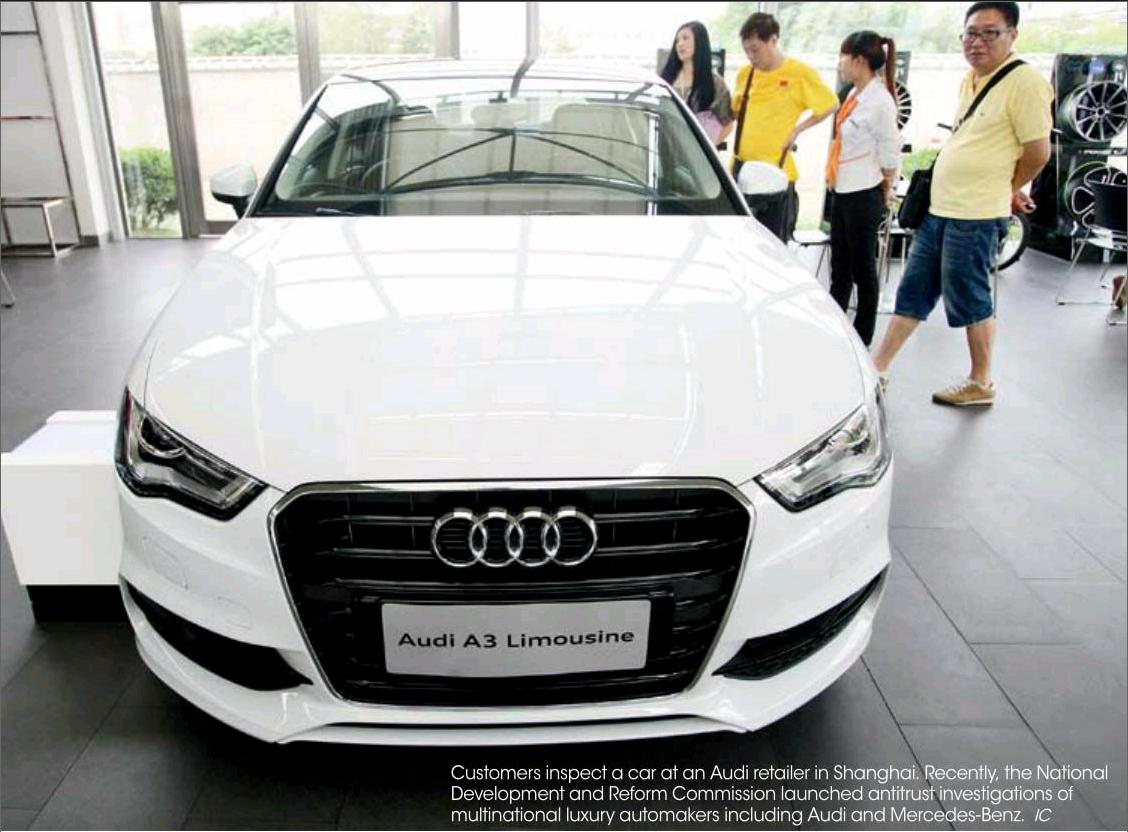Do Not Pass Go, Do Not Collect $200
by+Zi+Mo

Recently, many Chinese con- sumers have been eagerly waiting to see if the prices of Mercedes and Audi automobiles drop after antitrust investigations were launched by the National Development and Reform Commission of China (NDRC) targeting foreign luxury car makers including Mercedes-Benz, BMW, Jaguar Land Rover, and Chrysler, as well as 12 Japanese automobile parts producers.
On June 28, 2014, the State Administration for Industry and Commerce(SAIC), one of Chinas antitrust regulators, conducted raids of Microsofts offices in Beijing, Liaoning, Fujian and Hubei. Earlier, on June 16, the Chinese Ministry of Commerce (MOC) rejected the P3 alliance of Maersk Line, Mediterranean Shipping Company and CMA CGM, citing antimonopoly rules. The rash of high-profile antitrust investigations in recent weeks may be the tip of the iceberg for Chinas increasing enforcement of its six-year-old antimonopoly law.
The Falling Gavel
Antitrust Law of China was enacted on August 1, 2008. In complete market economies, monopoly laws are considered important regulations to protect market competition. Currently, China has three state-level government departments responsible for antitrust investigation and enforcement, including the Price Supervision and Antitrust Bureau under NDRC, the Antitrust and Anti-unfair Competition Enforcement Bureau under SAIC, and the Antitrust Bureau under MOC.
However, Chinas antitrust law seemed like all talk during its first four years. Not until 2013 did China start enforcing the regulations in a major way. That year, Chinese competition authorities consecutively levied huge fines on LCD touchscreen giants including Samsung, Chinese distilleries Moutai and Wuliangye, and baby formula brands including Biostime for price manipulation. This year, Chinese antitrust regulators began targeting U.S.-based tech companies Qualcomm and Microsoft, as well as luxury car brands including Audi and Benz.
Foreign luxury cars are priced much higher in China than other markets and bring their owners high maintenance and repair costs. In addition to the tariff factor, their lofty price tags can also be attributed to those carmakers dominant position in the Chinese market. Last April, the Insurance Association of China (IAC) and China Automobile Maintenance and Repair Trade Association released a report detailing the ratio between replacement cost of parts and the retail price of the entire car for some models sold in the Chinese market. Of them, a Mercedes-Benz C model has the most glaring ratio at 1,273 percent, a number which usually averages around 300 percent globally.
On August 6, 2014, NDRC officials announced at a press conference that antitrust investigations of Chrysler and Mercedes-Benz were nearing conclusion, and revealed that the two carmakers were involved in a monopoly, and that punishments would soon be announced. In response to Chinas antitrust investigations, several luxury car brands including Mercedes-Benz, Jaguar Land Rover and Audi, as well as Chrysler announced price reductions of some of their models and parts. For instance, FAW-Volkswagen announced a 20-percent cut on Audi part prices on July 26.
Although SAIC has yet to announce the results of its investigation of Microsoft, Shi Jianzhong, an antitrust expert and professor at China University of Political Science and Law, believes that the U.S.-based tech giant is suspected of abusing its dominant position in the Chinese market. In fact, Microsoft has already been fined several times for violating such laws in Europe.
No Discrimination
Due to the fact that several multinational companies were recently hit with Chinese antitrust investigations, some foreign media reports alleged that the move was actually China manipulating its competition law to protect domestic enterprises by pressuring foreign competitors. In fact, Chinese competition regulators have shown no discrimination in targets of their investigations, which included state-owned enterprises, private domestic companies, and multinational firms.
In March 2013, domestic liquor producers Moutai and Wuliangye were fined 449 million yuan for price fixing, the largest antitrust fine yet at the time. Even state-owned telecom giants China Mobile and China Telecom were hit with antitrust investigations due to their monopolization of the internet services market.
“China conducted antitrust investigations of Qualcomm and Microsoft not because they are foreign companies, but due to their dominant position in their respective markets,” explains Wang Xiaoye, a researcher at the Institute of Law under the Chinese Academy of Social Sciences.“This is normal in a market economy.”
In the opinion of Professor Liu Junhai, director of the Institute of Commercial Law at Renmin University of China, the recent antitrust investigations launched by China on foreign companies should be considered “rectifications” of the countrys super-preferential policies for foreign investors. “Frankly, we only emphasized attracting and encouraging inbound investments in the past, but neglected supervision and restriction of foreign investorsbehavior. Particularly, we did too little to investigate and punish foreign companies breaking Chinese regulatory rules.”
In fact, many multinational companies including Microsoft and Apple sell products at higher prices in China than in other markets. For instance, Chinese consumers pay about US$ 470 for the base iPad Mini with Retina display, while U.S. consumers pay $399. The price of a luxury car in China may be two or three times that in the United States. Chinese officials “feel Chinese consumers are being exploited,” said Marc Waha, a Hong Kong-based partner at the law firm Norton Rose. The countrys monopoly investigations aim to protect consumers.
Just as Professor Liu Junhai noted, free and fair competition is the source of energy for market economies, and Chinas recent monopoly investigations of multinational firms not only help maintain fair competition, but also help protect the interests of consumers.

